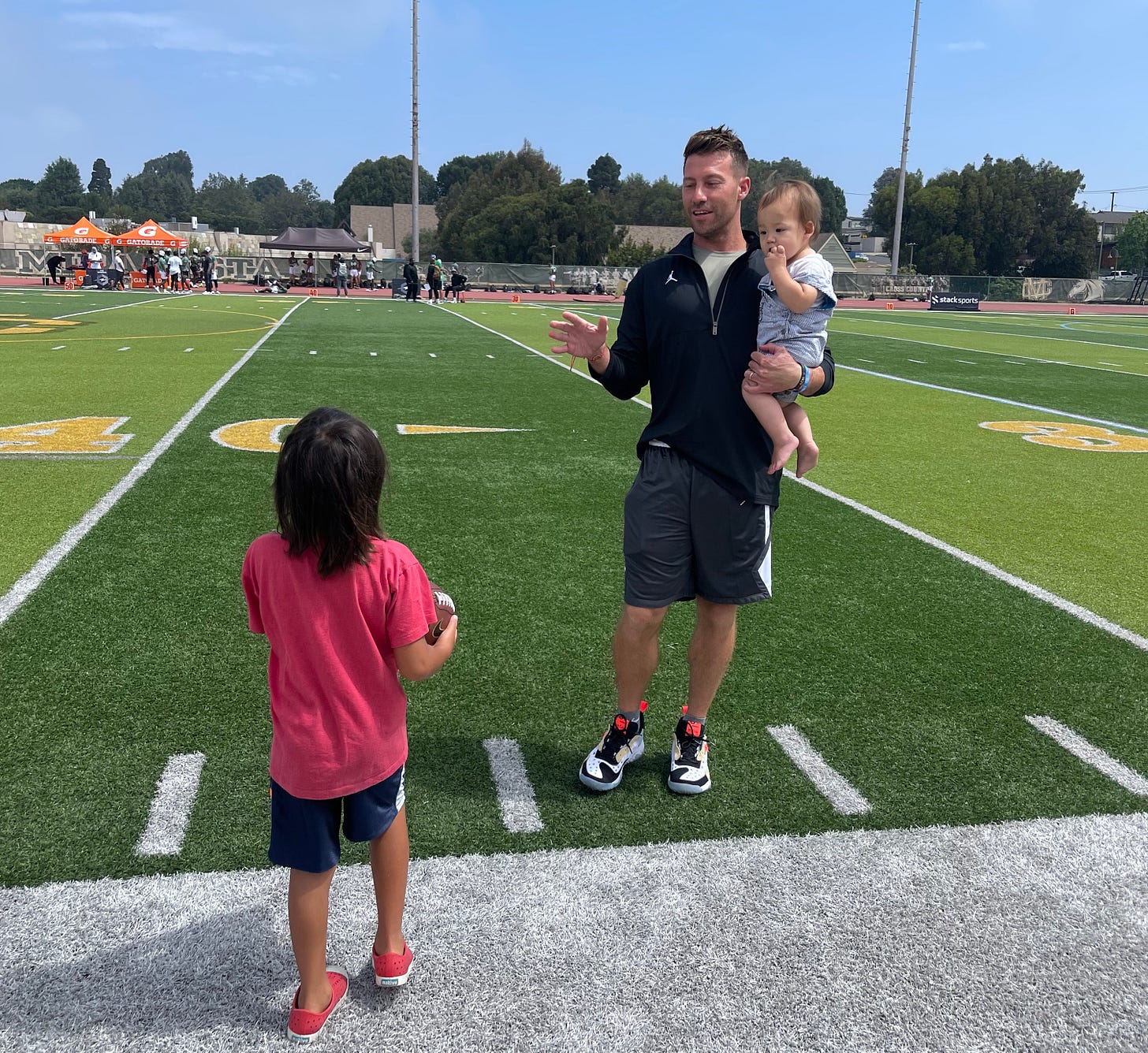Yogi Roth is chasing Roses
The I-5 Corridor catches up with the face of the Pac-12 Networks for a story on goals, storytelling and keeping dreams alive.
Yogi Roth started to feel guilty.
His job has stringent demands, requiring days and days on the road.
His oldest, Zayn, is 7 now. Zayn’s little brother Makaiye is 2-and-a-half. And Roth, a Pac-12 Networks college football analyst, felt absent.
But something clicked during his preseason Pac-12 football training camp circuit back in August. He was soaking in the early days of the Kalen DeBoer regime at a University of Washington practice when he made himself a promise.
“I'm gonna compete to be super present, wherever I am,” Roth told himself.
He’s stuck to it. He’s locked into his family while around the house and tries to involve his children with his work whenever he can. It’s a balance that’s become a crucial facet of his chaotic lifestyle, because even here a decade into his stay with the Pac-12 Networks, Roth still just really likes talking about West Coast football.
“It’s my dream job,” he told the I-5 Corridor.
And it’s a good time to talk about that dream job. The product out West is starting to once again align itself with the enthusiasm Roth brings. Football-wise, the strength of the league is maybe as strong as its been since the early 2000s, back when Roth cruised the USC sideline with Steve Sarkisian and Pete Carroll and oversaw marquee Trojans quarterbacks from the booth with Lane Kiffin.
“It was amazing for the fans of our league,” he said of the 2022 season.
With a few Pac-12 players in the weekly Heisman conversation, elite quarterbacks littered along Interstate 5 and previously moribund programs coming out of the woodwork, it was equally joyous for the face of the Pac-12 Network.
“I don't ever recall a year like this and I think next year is going to be even better,” he said.
It’s easy to become disenchanted with college sports at times and Roth is quick to admit it.
It’s become the Wild, Wild West: the NIL frenzy, portal hopping and chatter of conference realignment. NIL and the portal, he’s a fan of, although the lack of restrictions on both fronts irk him. The USC and UCLA departures certainly struck a nerve though.
He spent formative years at USC (2005-09) as a quarterbacks coach. Sarkisian and Kiffin gifted him his offensive knowledge. Carroll let him cling to his hip, showing him how a successful program is built, and nurtured, over time. It pieced together the foundation for his current day pursuits as an author, speaker and broadcaster.
And needless to say, envisioning a Pac-12 without the Trojans, and Bruins for that matter, wasn’t something he expected having to come to grips with.
He’s a believer in the six stages of grief and spent what he estimates was 4-5 days late last June coping with the news and parsing what meaning and direction he could take from it.
“I really just chose to say I'm gonna double down on the stories, and the humans and the games, educating people about the game, tracking it all,” he said.
“The phrase that gets bandied about a lot in our world today is ‘storyteller’ and sometimes I think that becomes a phrase that you can roll your eyes at a little bit, but in Yogi's case it's genuine,” added Roth’s broadcast partner Ted Robinson, one of his “greatest” mentors.
When Roth says “tracking it all,” it’s not an understatement either. He had plenty of guilty pleasures throughout the conference this season: That vastly overhauled Oregon State defense, the athleticism and movement of Oregon’s offensive line, Arizona’s dynamic receivers, the edge rushers at both Washington and Washington State.
“I could probably give you one for every team,” he said.
Oh, and Ja’Quinden Jackson over at Utah? The kid who went from taking quarterback snaps in Week 4 against Arizona State, to getting real touches as a tailback the following game?
“I don’t know if I've ever seen that,” he said. “I definitely have never seen that.”
By virtue of this sport’s ecosystem and Roth’s background, much of his storytelling of late centers around young quarterbacks — lightning rods for criticism amidst a social media-induced attention spike that’s shown no signs of slowing down.
So many of Roth’s most memorable moments in this industry, in this conference, have come through the lens of the quarterback. He’s been on the other end of a phone call when they’ve gotten out of rehab and with their families on the couch in their homes as they anguish over what college to commit to. He’s even stood next to them when they’ve gotten married.
“I really love that part of the job,” he said.
His experiences mentoring prospects and diving into the minds of elite athletes has helped make him become a repeat guest at the Elite 11. There, his involvement coalesced into the production of his book, “5-Star Qb: It's Not About the Stars, It's About the Journey,” which was published late last July.
After several years at the event, listening to the recruits like his “life depends on it,” the project blossomed. The book is a forum for young quarterbacks. It dives into the minds and lives of over 50 signal callers, largely through their own words. It’s a guide, an instruction manual, of sorts, to help these quarterbacks navigate a sometimes-unwelcomed lifestyle, one many of them are often unprepared for.
“I don't want to diminish it, but the football is kind of the easy part, right?” he said. “And that's why I wrote the book… I can't talk to every guy, but they could take this book and learn from all these other experiences.”
So when Roth says he’s going to double down on the storytelling, it's projects like these he’s talking about.
“[Storytelling] is in his DNA,” Robinson said. “It's how he's wired. And I think it's way greater than just our conference. He has a love of college athletics and a love of college athletes.”
When Roth sits down annually with each new group at the Elite 11, one of the first things he has them do is pull out something to write on.
He preaches the words, “Pay attention to your intention.”
Then, he asks them what their intention is, instructing them to jot it down.
“I think pretty often, this generation of athletes, and definitely my generation of athletes, we weren't aware of our intention, but it would seep out and that’s where our energy would go,” he said.
It begged the question, what’s Roth’s intention?
He, of course, broke it all down like a true broadcast analyst, assigning his thoughts to one of two buckets: His hopes, and his goals — what he can control.
He hopes he can work with Robinson, Michael Molinari, Ashley Adamson and the rest of his crew that “changed his life” for the next 20 years. He hopes he can serve this game and this conference, which he “owes everything to” for another few decades, as well.
He’s been around the league since he came out to USC to help work summer camps when he was 19, and the sport itself for far longer.
“I feel like I really am a part of this league and the fabric of it over the last 15 years or so,” he said.
And that goal? The dream of things to come? Simple.
“I want to call the Rose Bowl,” he said. “I always have. I’ve coached in four of them. That’s my career dream. Where? How? Doesn't matter to me.”
— Shane Hoffmann
@shane_hoffmann
Need a last-minute gift idea? You can always gift a subscription, or check out some of our new merchandise.







I can’t even imagine what the work life balance must be like, but I can see he understands the importance of it. Great story!